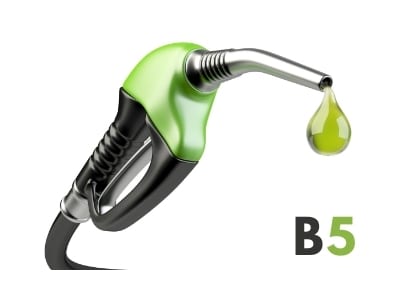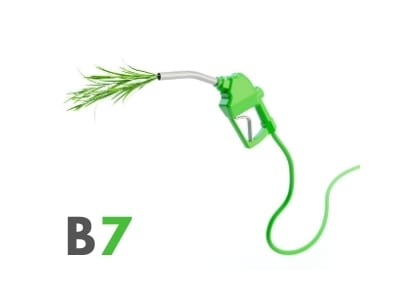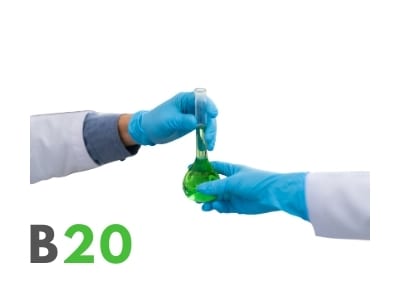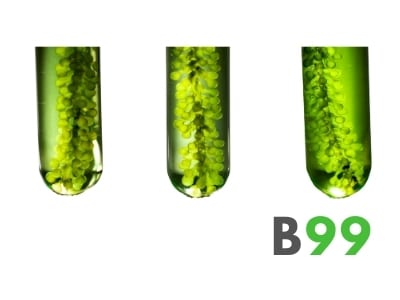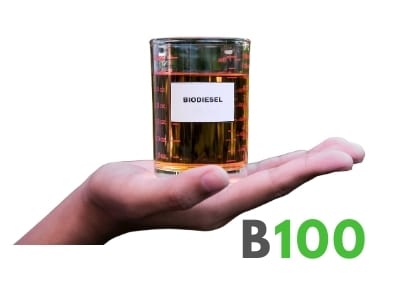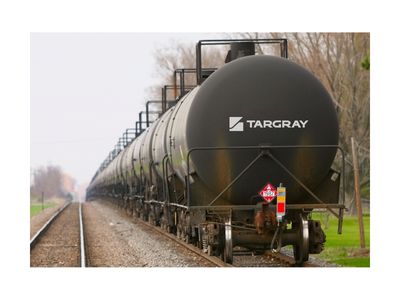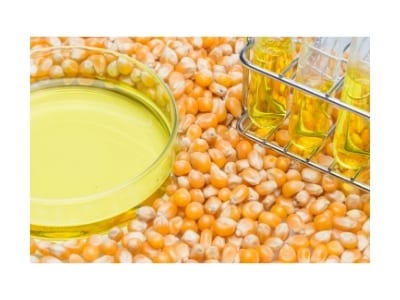Terminology of Biofuel Blends
This table contains definitions of common biofuel blends for ethanol, biodiesel and drop-in fuels like renewable diesel.
| Biofuel |
Definition |
B100 |
B100 (pure biodiesel) is a 100% bio-based fuel derived from biomass. It can be used in diesel engines built since 1994, provided the engines are fitted with biodiesel-compatible parts. Biodiesel feedstocks include vegetable oils, animal fats, used cooking oil (UCO) and algae. |
B5 |
B5 is a biodiesel blend consisting of 5 percent biodiesel and 95 percent petroleum diesel. It is the most commonly found biodiesel blend in the U.S., where its use is mandated in several states. |
B7 |
B7 is a biodiesel blend containing 7 percent biodiesel. Like all blends containing between 6 and 20 percent biodiesel, B7 fuel is covered by the ASTM D7467 specification. Its use is mandated in several jurisdictions including Germany (for road use) and Malaysia (for industrial use). |
B10 |
B10 is the term used to describe biofuel blends with 10 percent biodiesel content. It is most commonly found in Southeast Asia, primarily due to biodiesel policies in Thailand and Malaysia. |
B20 |
B20 is a higher-level biodiesel blend containing up to 20 percent biodiesel. A majority of diesel car and truck makers selling in the United States allow B20 use in their vehicles. |
B99 |
B99 is the highest-level biodiesel blend, containing between 1 and 0.1 percent petroleum diesel. This fuel blend is more widely distributed than pure biodiesel (B100) in the United States. |
E10 |
E10 is an ethanol blend consisting of up to 10 percent ethanol and 90 percent gasoline. It is the most common of all biofuel blends currently sold in the United States. |
E15 |
E15 is the term used for biofuel blends containing 15 percent ethanol. The Environmental Protection Agency approves E15 for use in vehicles model year 2001 and younger. |
E85 |
E85 is a higher-level biofuel blend containing between 51 and 83 percent ethanol. This blend should only be used in FFVs (Flexible Fuel Vehicles). |
Renewable Diesel |
Renewable diesel is a biomass-derived diesel fuel refined via hydro-processing. As a result of the refining process, this fuel is chemically identical to petroleum diesel. |
Cellulosic Biofuel Blends |
Fuels derived from non-food-based biomass such as crop residue or switch grass are referred to as cellulosic biofuels. One such example is biobutanol, which can be blended with other fuels and used in conventional gasoline vehicles. |
Related Content
B5 Biodiesel
B5 biodiesel is a low-level biofuel blend consisting of ≤5 percent pure biodiesel and ≥95 percent petroleum diesel fuel.
B7 Biodiesel
B7 biodiesel is a low-level biofuel blend consisting of petroleum diesel and up to 7 percent bio-based diesel.
B20 Biodiesel
B20 Biodiesel is a common biofuel blend which consists of up to 20 percent Biodiesel and 80 percent petroleum diesel.
B99 Biodiesel
B99 Biodiesel is a high-level biofuel blend consisting of up to 99.9 percent biodiesel and 0.1 percent petroleum diesel.
B100 Biodiesel
B100 biodiesel (100% biodiesel) is an EPA -registered fuel and fuel additive designed as a blendstock for use in blending with petroleum diesel.
Biodiesel Supply
Our biodiesel supply business markets biodiesel to fuel distributors, retailers, traders and refineries throughout the United States, Canada and Europe.
Feedstock Marketing
Our ISCC-certified biofuels business is a trusted source for customers seeking commercial quantities of used cooking oil, animal fats, and other biomass feedstocks.
Biofuel Blends
Learn about the various types of biofuels we supply around the world. Notable products include pure biodiesel (B100), renewable diesel, and blended fuels.
